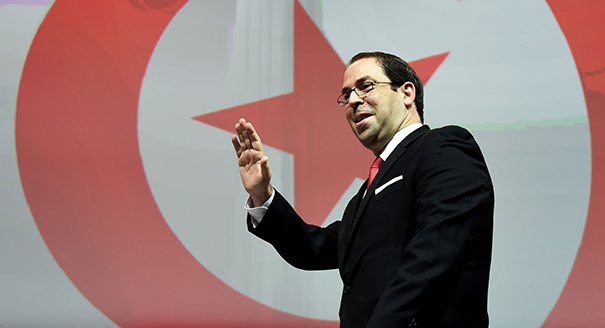On November 5, Tunisian Prime Minister Youssef Chahed announced a major cabinet reshuffle—the third since he took office in August 2016. The new government, approved by parliament on November 12, replaced thirteen ministers and five state secretaries in what Chahed described as an effort to speed up stagnant economic and political reforms.
From the start, the reshuffle was shrouded in controversy. First, President Beji Caïd Essebsi’s spokesperson criticized Chahed for failing to properly inform the president of his intent in advance. While the constitution clearly states that the prime minister is responsible for “creating, modifying, and dissolving ministries and secretaries of state” and must only consult the president “in the case of the ministers of foreign affairs and defense,” Chahed’s decision to undertake this reshuffle without first getting Caïd Essebsi’s blessing led some to question the constitutionality of the act. Certain members of the president’s and prime minister’s party, Nida’ Tounes, even called the move a “coup.”
Moreover, the move generated controversy following the appointment of two notable ministers: René Trabelsi, the tourism minister, who is the first Jewish minister since the 2010 uprising, and the third since independence in 1956; and Kamal Morjan, the public sector minister, who served as both defense and foreign minister under former president Zine al-Abedin bin Ali. Trabelsi’s appointment has attracted strong criticism nationally as some Tunisians regard him as being an agent of Israel, while others (including members of the Ennahda Party) have called on the country to accept Trabelsi as a Tunisian first, and ignore his religion. Morjan’s appointment, in turn, is a signal to former regime figures who make up a significant portion of the membership of Nida’ Tounes that they are welcome in Chahed’s camp.
The rift between the president and prime minister is not a result of the reshuffle, but rather its main cause. Chahed has been involved in a public and dirty fight with the president’s son and the head of Nida’ Tounes, Hafez Caïd Essebsi. Both the father and son have repeatedly called for Chahed to step down as prime minister and Hafez recently suspended Chahed’s membership in Nida’ Tounes. Second, the cabinet reshuffle comes following the president’s announcement that he had ended the five-year consensus between his party, Nida’ Tounes, and Ennahda, due to Ennahda’s disagreement with Caïd Essebsi over unseating Chahed.
The battle for power between the Caïd Essebsi family and Chahed has divided the Tunisian political class and slowed down the government’s and parliament’s capacities to implement crucial policies to tackle an increasingly problematic macroeconomic environment. Therefore, in undertaking this reshuffle, Chahed and his supporters are seeking a political victory for the prime minister against Hafez and others in Nida’ Tounes.
Will the move pay off? Chahed has scored points against his political rivals. The overwhelming approval of the cabinet reshuffle by parliament (130 votes in favor, more than the 109 votes needed) showed that the Caïd Essebsis, despite boycotting the session, could not convince enough parliamentarians to vote against the new government. Nida’ gave its ministers an ultimatum to either stay in the party or the new government, but not both. The party, which had already hemorrhaged parliamentarians during the political crisis between Chahed and Hafez Caïd Essebsi, saw further losses when two ministers and two state secretaries chose to resign from the ruling party in order to remain in the government. Once the largest party in parliament (with 86 seats out of 217), but today having only 46 parliamentarians, Nida’ Tounes is becoming a marginal parliamentary opposition party with little decisionmaking power.
The new cabinet has also empowered Nida’ Tounes’ traditional rival, Ennahda, giving it eight portfolios—four ministries and four state secretaries.* Notably, for the first time two secular parties, Machrou Tounes and Moubadara, entered the government, each with two ministries.
Ahead of the 2019 parliamentary and presidential elections, the cabinet reshuffle is reshaping political alliances: After months of political struggle between the Caïd Essebsis and Chahed on the one hand, and the Caïd Essebsis and Ennahda on the other, the main winner of these contests are Chahed and Ennahda, while Nida’ has never been so isolated.
Chahed, who many saw as a puppet of Beji Caïd Essebsi upon being appointed prime minister in August 2016, took a big risk by stepping out of the president’s shadow and creating new power alliances without the president’s consent. As the country moves closer to the 2019 elections, Chahed’s maneuvers could have lasting consequences for Tunisia’s future. This is also an interesting trial balloon for a potential Chahed run at the presidency next year. It remains to be seen, however, whether the prime minister will come out of this episode as a strong, independent leader capable of moving the country forward, or as someone pursuing his own political advantage with little regard for the Tunisian public.
Nevertheless, the reshuffle may cause more harm than good. With less than a year until national elections, most politicians will hesitate to enact reforms that will not pay off until after 2019. Furthermore, the reshuffle has increased partisan bickering within the government. Therefore, Tunisians, who have seen their living standards diminish since 2011, are victims of this political game and will continue to suffer and be further disillusioned by the post-2011 political process.
It is unlikely that the cabinet reshuffle will bring dramatic economic improvements in the short term, but this bold move by Chahed appears to have kept him in power—for now.
* This sentence was modified because the information initially contained in it was inaccurate.






